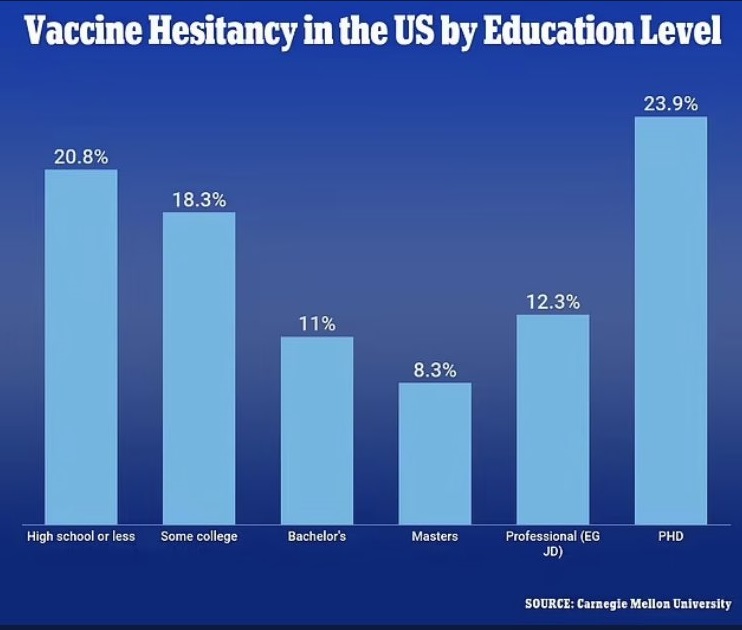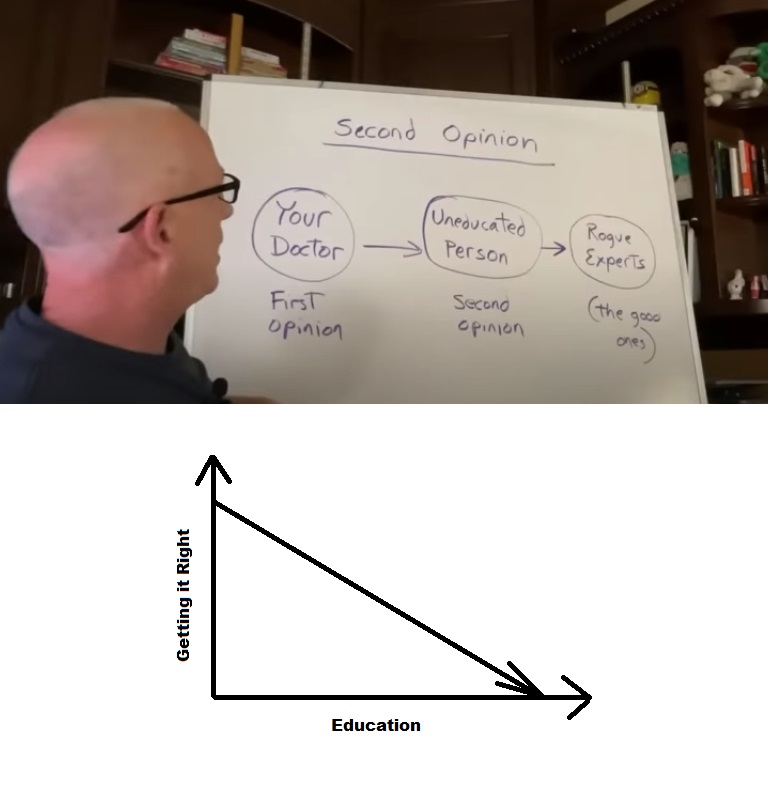
Scott Adams recently broke the internet with a startling admission to the ongoing Covid vaccine debates. Scott made a resounding admission to all those listening on the internet that “The anti-vaxxers clearly won – you’re the winners!” Scott has stated in the past that he has taken the vax.
Some suggest that his admission was trolling, as it was a bit over the top. Others were angry by his disingenuous words “anti-vaxxers” – as many believe that they are not anti-vaxxers, they merely didn’t want this specific Covid-19 vaccine. See Scot make this pronouncement by doing mental backflips and somersaults in the video below.
Some critiques of Scott pounced on Scott’s notion that there were winners and losers – it’s about people’s health, many cried. This critique is unfair. Scott was discussing our decision-ing processes and not making fun of whether one got vaxxed or not.
For those who do not know, Scott Adams is an American author and cartoonist. He is the creator of the syndicated Dilbert comic strip and the author of several nonfiction works of satire, commentary, and business. If you do watch some of Scott’s live-streams, you will note quickly that, though sometimes in a dry presentation, Scott has some brilliant and witty takes on the issues we face today. Perhaps rightly so – with a bit of hubris, one can tell that Scott believes he is one of today’s intellectuals and influencers of our time.
Scott’s basic argument was that the un-vaxxed are in the best position today relative to the Covid continuing vaccine debate – to vax or not to vax. Scott postulates that given that Covid death and hospitalization today are of less risk for most, the un-vaxxed do not have the risk of potential future adverse effects of the Covid vaccine, and they have better natural immunity for future Covid infections – as opposed to the vaxxed.
Of course, this is based on recent data. But at the time when many had to make this decision to be vaxxed, one could only base their decision on what limited data was available at the time. How was one supposed to decide on this question? You can see Scott’s full live-stream video on this here. What is interesting is not to get into the specifics of the Covide vaccine debate but rather to understand better the decision-ing process.
Several reports have come out on the demographics of why people got vaxxed and vaccine hesitancy. One report indicated that the less one was educated, the more one had vaccine hesitancy – though the “super” educated, PhDs, had similar vaccine hesitancies as the less educated. See this in the chart below.

Remember, according to Scott, the un-vaxxed got it right. Scott posed a perplexing notion – the uneducated got it right compared to the educated relative to the Covid vaccination debate. So by logical deduction, should we stop listening to the educated and start listening to the uneducated? They got it right, after all. Scott “trollingly” joked that perhaps we should have a Davos of the uneducated instead of the current Davos of the supposed super-elite educated – at the recent World Economic Forum.
Below, Scott lays out this notion in one of his infamous whiteboard explanations. And below Scott’s whiteboard explanation, we have added a graph showing these two dynamics of – on the “X” axis of education and on the “Y” access the “Getting it Right” outcomes – i.e., the more education, the less “Getting it Right” outcome.

In recent years the “uneducated” seem to have come up with the right or potentially right answers on a variety of topics, not just the Covid vaccine debate – for example, climate change, woke culture, and the surveillance state, to name a few. But if one does not like Scott’s term “uneducated,” what term (or terms) should we use for this “X” axis?
Perhaps, there is not one word, but many that are part of a “decision matrix” that gets overlooked by the educated. Below are some ideas that could fit into this “decision matrix.” If one would use a term, perhaps a better term would be critical thinking – is the analysis of available facts, evidence, observations, and arguments to form a judgment. Critical thinking does not equal education.
- Follow the money – if there are monetary motivations (this could extend to political status, which often can translate to money), one should question those who have a potential gain if you accept their notions.
- Censorship – if one has to censor your critiques, it calls into question one’s own thinking.
- Hubris – people with better degrees are just that. Those educated tend to support their own community’s belief, forgoing critical thinking.
- A reasonable level of distrust of people or organizations (public and private) – that have been wrong in the past.
- Beware of “group-think” – everyone can be subject to this. If there is a debate on a subject where there is significant controversy, one still needs to have logical arguments – watch for red flags like, “the science is settled,” or “I would never believe people I don’t like or people I do like.”
- Some reasonable level of understanding or education on a topic – no doubt, would be useful.
It was interesting to see that Scott’s “X” axis was the chosen word “uneducated,” though he did have a few similar thoughts presented above. Why did Scott go to the use of this word? Perhaps this was the fatal flaw in his thinking – hubris. In his own words, Scott got the wrong answer concerning the vax. Scott believes the right answer could not have been known – certainly not by one of those uneducated people. This was suggested in the following Tweet he made – the right answer was that it was a “coin flip.”
It was a coin flip and some guessed right.
— Scott Adams (@ScottAdamsSays) January 21, 2023
Hence, Scott’s commentary was somewhat of a troll, though he may not realize it. My guess is that Scott won’t start to believe in the uneducated anytime soon, regardless of his recent experience. Being a Sunday Thoughts, perhaps we can get some understanding from the Biblical text, which can be found in 1 Corinthians 1:27:
“But God hath chosen the foolish things of the world to confound the wise; and God hath chosen the weak things of the world to confound the things which are mighty.” Note that a fool is not the same as stupid.
So did Scott get confounded by the foolish? Perhaps. Does this mean we should not listen to Scott Adams? Not at all. Scott Adams is still a brilliant man – just always be aware of one’s flaws when doing your own critical thinking.
Give us your thoughts in the comment section below on how you do your critical thinking when trying to decide things in your own life.
By Tom Williams








